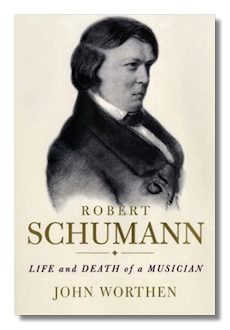
The Internet's Premier Classical Music Source
Related Links
-
Introduction
Acoustics
Ballet
Biographies
Chamber Music
Composers & Composition
Conducting
Criticism & Commentary
Discographies & CD Guides
Fiction
History
Humor
Illustrations & Photos
Instrumental
Lieder
Music Appreciation
Music Education
Music Industry
Music and the Mind
Opera
Orchestration
Reference Works
Scores
Thematic Indices
Theory & Analysis
Vocal Technique
Search Amazon
Recommended Links
Site News
 Book Review
Book Review
Robert Schumann

Life and Death of a Musician
John Worthen
New Haven & London: Yale University Press. 2007. 496 pp
ISBN-10: 0300111606
ISBN-13: 978-0300111606
The view of Schumann as bipolar or manic-depressive goes way back and, in addition to presenting a distorted view of the composer, has tended to support a distorted view of artistic creativity in general as a product of "mad genius" going back as far as Plato and at least as recently as a Bard Music Festival discussion in 1994 (related in Jean Tobin's Creativity and the Poetic Mind, p232 and following.) In challenging this view of Schumann, especially elaborated in Peter Ostwald's 1985 psycho-biography, Robert Schumann, Music and Madness, Worthen very refreshingly and convincingly notes that much of the speculative interpretation of Schumann's life along these lines is simply not supported by a sensible and straightforward reading of the evidence. Schumann did have many physical ailments and occasional bouts of panic attacks.
There is a huge quantity of documentation for Schumann's life, notably his own journals and household records, as well as medical records from his final years. (Clara Schumann and her heirs, more private than Robert, destroyed many of her letters and some of her journals.) Worthen is able to relate details of Robert and Clara's very first kisses and what they meant to this quintessentially Romantic couple. Not so Romantic are vivid accounts of Schumann's youthful dissipation, his efforts to control his heavy drinking, and details of the treatment he received for the syphilis which later maddened and killed him. Worthen even communicates the name and probable identity of the woman who presumably gave it to him.
Worthen gives a lengthy account of the generally well known struggle, personal and legal, of Robert and Clara to marry in the face of the implacable opposition of Clara's father, Friedrich Wieck. One point not so well known, even to Robert Schumann who had studied law, is that in Saxony at that time a woman could not marry without parental consent even after she had reached the age of majority.
Although Robert and Clara's love may have been one of the most famous in history, their married life was not an idyll and included the down to earth frictions and difficulties of any relationship and more than one contretemps was recorded for posterity to learn about. In common with Bach, Schumann had to be much concerned with the family income needed to support the household and exact detail is known about the incomes of both composers – and Clara's. Clara's career suffered from Robert's desire for a traditional and large family – her many pregnancies made it difficult for her to travel, for one thing. Robert may have been a better father than a husband; he clearly loved his children and enjoyed spending time with them. His need in the early years to compose at the piano in a thin-walled apartment made difficulties. Even though Clara had her own piano, her playing became a distraction to him. Later, Schumann composed without the need for a piano until he had finished works he completed in his head.
Schumann's creativity also evolved over time from an outpouring from inspiration to what Worthen calls a more professional ability simply to write music. Very many works, such as the Spring Symphony and many songs, were composed with amazing rapidity – one thinks of Mozart. By way of exception, the C Major Symphony took him a long time to complete and orchestrate to his satisfaction, even though the work was mostly set down in a couple of months. He kept revising it following performances. The D Minor Symphony, composed second but numbered 4, as is well known, failed to attract a publisher simply because the first performance was not successful. Schumann never heard a concert performance of his Cello Concerto, from his late period in the Rhineland. He was enormously prolific in that period, though, until his sudden mental "catastrophe," which put him in an asylum.
This is simply one of the best and most satisfying musical biographies – of anyone – that I have ever read. Even though it does not include analysis of Schumann's music as such it does place just about all of his works in the context of what Schumann was doing at the time and indicates what many of them meant to him and to Clara. One thing I did miss was an account of Schumann's literary interests. But that is available elsewhere.
Copyright © 2008, R. James Tobin


















